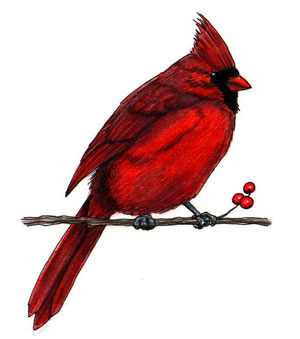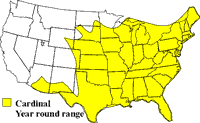Attracting several pairs of cardinals to the backyard is a big plus for bright color during the breeding season and as a contrast against the white of winter snows.
 |
Their distinctive red color and perky crest make northern cardinals a welcome sight in many backyards all over the country. So loved is this bird that 7 states have designated cardinals as their state bird. They become familiar sights because they are permanent residents. Since they do not migrate, they frequent residential yards to feed on seasonal seeds and berries from common ornamental trees and shrubs that dot the landscape. If they are lucky, the homeowner will have a feeder full of seeds out for them also. In the winter the males’ beautiful red color is even more pronounced, enhanced by a backdrop of snow.
Originally a southern bird, the cardinal’s range has expanded northward as far as Maine and New Brunswick over the last 20 or 30 years. Their natural habitat is wooded edges and thickets. You see them in community parks, cemeteries, landscaped parking lots and other open spaces where low growing shrubs provide food and shelter.
Recognizing Cardinals
Male cardinals are the only all-red bird with crests. They are about 7 1/2 to 9 inches long. Their only distinguishing contrasting color is a black patch surrounding their broad, yellowish bills. Females also have crests, but are buff-brown with some reddish tinge on their wings and tail. Their bills are orange. Young cardinals resemble the females, only the youngsters have black bills and limp crests.
It is easy to recognize cardinals by their songs. Their call, a piercing whistle whit-tuuu, whit-tuuu, cherr, cherr, cherr, signals their proximity. During mating season they call out pret-ty, pret-ty, pret-ty. Cardinals seem to need less sleep than other songbirds. They are often among the first calls you hear a bit before sunrise, and are almost always that last birds to leave the bird feeder in the evening a little after sunset.
 |

